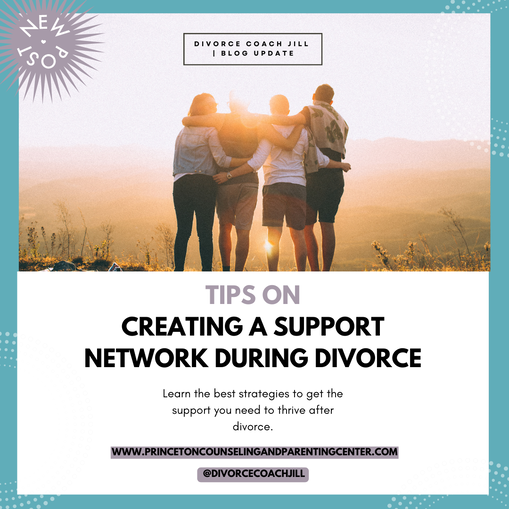|
Setting boundaries with your ex-spouse or any difficult person can be complicated. Many of us are taught as children that being nice means not asking for what you want but that’s exactly what you need to do when you’re an adult, as long as it’s in a healthy, respectful way. It can be challenging to set boundaries with someone who doesn’t respect them, but it is possible with the right approach. Here are some tools that will help you set boundaries with your ex-spouse or any difficult person:
1. Identify Your Boundaries The first step in setting boundaries is to identify them. Think about what behaviors or actions from your ex-spouse or difficult person are not acceptable to you. These may include things like name-calling, yelling, or invading your personal space. For everyone this is different. Really think about what you think is ok and what’s not ok. 2. Communicate Your Boundaries Clearly When setting boundaries, it is important to communicate them clearly. Be direct and specific about what behaviors or actions are not acceptable to you. Use “I” statements to express how their behavior makes you feel. You can’t worry about being nice - you can be respectful while not being nice and set a clear boundary. If you’re worried about how to do this, practice in a mirror or with a close friend. If you talk around an issue instead of stating it clearly, the person may not understand what your boundary is. 3. Stick to Your Boundaries Many people communicate a boundary and think that’s the end of setting a boundary. Actually, that’s just the beginning. Once you have communicated your boundaries, it is important to stick to them by doing something. This may mean walking away from a conversation or ending a phone call if your ex-spouse or difficult person crosses a boundary. Sticking to your boundaries is the only way to show that you are serious about them. 4. Don’t Engage in Arguments You don’t have to say anything once you’ve communicated a boundary clearly. Defending or arguing will only escalate the situation and make it more difficult to set and maintain boundaries. Stay calm and don’t get defensive when communicating your boundaries. 5. Seek Support You may have difficulty setting boundaries because of experiences you had when you were a child when you tried to set a boundary. It’s important to seek support from friends, family, or a therapist. They can provide you with emotional support and help you stay accountable to your boundaries. Setting boundaries with your ex-spouse or any difficult person can be challenging, but with these tools, you’ll be able to set clear boundaries, avoid escalations and arguments and stick to the boundaries that you set. If you haven’t been able to set boundaries in the past, it may take some time and patience to get good at these skills. Practice using these tools and eventually you’ll be awesome at setting boundaries with everyone you need to in your life! Going through divorce can be one of the most challenging experiences of your life. It's easy to feel overwhelmed, stressed, and uncertain about what the future holds. However, it's important to remember that divorce doesn't have to mean the end of happiness. By taking proactive steps to care for yourself and your emotional well-being, it's possible to find happiness again, even during the divorce process.
One powerful tool for finding happiness during a divorce is divorce coaching. A divorce coach is a trained professional who can provide guidance, support, and resources to help you navigate the emotional and practical aspects of the divorce process. A divorce coach can help you manage your emotions, communicate effectively with your ex-spouse, and develop a plan for the future that meets your needs and goals. Here are three steps you can take to find happiness again during a divorce: 1. Take time for self-care: Divorce is a stressful and emotional experience, and it's important to take care of yourself during this time. Make time for activities that bring you joy and relaxation, such as exercise, meditation, or spending time with friends and family. 2. Focus on the positive: When going through a divorce, it's easy to get caught up in negative thoughts and emotions. Instead, focus on the positive aspects of your life and the things you are grateful for. Practicing gratitude can help shift your mindset and improve your overall well-being. 3. Develop a plan for the future: While divorce can be a difficult process, it's also an opportunity to create a new life for yourself. Take time to think about your goals and aspirations for the future, and work with a divorce coach to develop a plan that aligns with your vision. If you're going through divorce and want support and guidance to find happiness again, I can help. As a divorce coach, I offer personalized support and resources to help you navigate the challenges of divorce and create a plan for a brighter future. Contact me today to schedule a consultation and learn more about how divorce coaching can benefit you. To contact me for divorce coaching, visit my website at www.divorcecoachjill.com. You can schedule a consultation to learn more about my services and how I can help you through this challenging time. With my support and guidance, you can find happiness again during and after the divorce process. Divorce can be a difficult and lonely experience. Having a strong support network during divorce can make a world of difference. Building a support network can be tricky as people going through divorce can feel shame about the divorce and can isolate themselves. Below are several ways to create a supportive network during a divorce.
Friends and Family Your support network should include people who are understanding, non-judgmental, and have your best interests at heart. These people could include close friends, family and others in your network such as mentors or religious professionals. It’s important that you let them know what you need from them because they may not know how to help you. Do you need them to listen? Do you want advice? Do you just need them to help with the kids? Clearly communicating what would help you the most is key to having the right support around you during divorce. Community While friends and family are an important party of your support network, they may not understand what you’re going through. If they haven’t been through divorce, they probably don’t really know how overwhelming and devastating divorce is. They may say the wrong thing or be so consumed with their own feelings that they can’t support you. That’s why support groups and other divorce communities can be so helpful. There are many online and in-person divorce support groups and communities. Connecting with others going through divorce helps you recognize that you’re not the only one who’s feeling so devastated. It can help with the healing process. Listening to others stories and hearing about others who’ve survived divorce can give you hope for the future. They can share what has worked for them and what hasn’t which can help you have a better idea of how to move forward. Professional Help There are a number of divorce professionals that can help you as you go through divorce. Many people hire an attorney and let the attorney lead their divorce. That can lead to an increase in cost and conflict. Here are professionals that you can use during your divorce:
Remember, asking for help is a sign of strength, not weakness. Your divorce does not have to define who you are. It is a transition and a new chapter in your life. By creating a strong support network and taking advantage of the services of a professional such as divorce coach, you can move forward with your life in a positive and healthy way. The holiday season is supposed to be a joyful time but for many people who are going through difficulties, holidays can be tough. Divorce, loss, an illness or a marriage that’s in conflict can all make holiday time less joyful. But there are things that you can do to make the holidays better, even if you’re dealing with tough times.
1. Don’t put extra pressure on yourself There is no rule that you have to celebrate the holidays in a certain way every year. Do you like having a big celebration or would you rather do something smaller and casual? Maybe you want to watch movies, read a book or go snowshoeing. You get to decide each year how you’re going to celebrate the holiday season. You don’t have to do what you’ve done in the past. You can make new traditions based on what’s best for you. This year, take the pressure off of yourself and create memories in a different way so that you can put your feet up and relax. You deserve it! 2. Spend the holidays with who you want to spend it with You don’t have to spend the holidays with people who aren’t kind, caring and supportive of you. If you’re used to spending the holidays with family members who make you uncomfortable or who don’t really understand you, take a break from them this year. If you’re divorced and don’t have your children, find a good friend or family who you want to be with. If your in-laws are not who you want to be with, spend the time with just your immediate family. Too may times, we do things because we’ve done them in the past. This year, do what works best for you. 3. Make sure that you reach out to loved ones Many people who are struggling during the holidays don’t tell their loved ones how they feel. They may be ashamed or don’t want to bother anyone. But people who are close to you would probably want to help. They might be going through their own struggle and they would benefit from connecting with you. If you don’t have anyone you feel comfortable talking to, you can always reach out to a therapist. 4. Focus on the positives Even if times are tough there are always positive things going on in life. Every day you can watch the sunset or take a walk in nature. You have your good health or your children to focus on. You are able to walk, ride a bike and take a warm bath. There are so many small things that we take for granted that we can be grateful for. What is positive in your life? Final Thoughts When you’re going through a difficult situation, it can be hard to get through the holiday season. Make sure that you don’t put unnecessary pressure on yourself, you’re intentional with who you spend your holiday with, reach out to loved ones and focus on the positive. There are ways to turn around a holiday season that you’re dreading and make it into a positive experience for you and your family. Is your marriage a mess but you’re afraid to get a divorce? Are you scared of being on your own? Are you staying together for the kids? There are so many things to think about before you decide to get a divorce. The average person thinks about divorce for 7 years before taking that step. So it makes sense if you’re stuck and not doing anything about it.
If you’re feeling that you don’t want to stay married but you don’t want to get divorced, you’re not alone. Many people stay in their marriages because they’re scared of the alternative. It feels better to be together because your children are in an intact family. And staying married feels safe and stable. But if you’re unhappy, depressed or anxious, that’s not really stable. And if your children see conflict or tension, that’s not good for them. If you’re unhappy in your marriage, it’s taking a toll on you. Even if your marriage looks ok from the outside, you know what’s really going on inside. If there is no connection, no communication, no partnership or respect, it can feel horrible. Maybe one partner shows their rage toward the other in private but everyone outside the family thinks he or she is a great person. Maybe one partner isn’t willing to work on the marriage and expects the other to accept it as it is. Being in an unhappy marriage can have emotional and even physical consequences. I understand; I was there too. I started having optical migraines and acid reflux which are both physical conditions that stem from stress. Once you realize that there are serious negative consequences to being in an unhappy marriage, you can start to get closer to a decision to divorce. Understanding that you deserve to be happy, and your children deserve to have happy parents, provides you with the courage to overcome your fears of getting divorced. Millions of people have gotten through divorce, you can too. Get support as you go through this very stressful time - get support from family, friends, a therapist or from my group coaching program – Thriving Through Divorce. If you know it's the right decision, you can find the courage to do this. You can build an amazing new post-divorce life for yourself and your children. Divorce is one of the most stressful experiences and involves complex emotional, financial and legal issues. In order to be able to think clearly through your divorce, it’s so important that you take care of your emotional self.
1. If it feels wrong, don’t do it The ability to set boundaries is crucial and can be hard, especially after separating from a long-term relationship. What do healthy boundaries look like? Not doing something that feels wrong or uncomfortable is a great starting point. If your Soon-to-be-ex (STBX) tells you to do something and you don’t feel comfortable doing it, you need to be able to let him or her know that you disagree. This doesn’t mean that you should be disrespectful, it means that you can let them know that you appreciate their perspective. But in the end, you get to decide what you want to do. 2. Stay calm when you communicate with your STBX Communication is key in any relationship, divorce included, and being calm will help you effectively communicate with your STBX. Try not to react to the emotion in the other person’s voice, this can escalate a simple conversation into an argument. Instead, recognize that you don’t have to respond right away. Take some time to breathe deeply, and think about how you want to respond. Not only will this prevent an argument, but it’s less emotionally draining on you. Lastly, if the conversation is getting escalated, remove yourself until you are both able to respond calmly. 3. Trust your instincts Your instincts are there to tell you when a boundary is being pushed too far and it’s key to listen to them. When you can feel yourself being pushed too far or being put in an uncomfortable situation, trust when that gut feeling kicks in and walk away. 4. Don’t be afraid to say “no” Sometimes we say yes because we feel intimidated or want to please others. Saying “no” helps to establish healthy boundaries and enables others to understand what to expect from you. When a situation arises, you might feel obligated to go along for the sake of agreement but if you say yes and then feel resentful, that’s not good for anyone. Learning to say no and not feel bad is key to taking care of your emotional self. 5. Let go of what you can’t control You won’t be able to control everything. There are things that may happen that are not ideal for you or your children. In most cases, everything will still turn out ok, even if it’s not exactly what you wanted. Detaching and letting go are such important skills when you’re going through divorce and will save you so much stress. If you’re struggling with this, I recommend practicing mindfulness and meditation. Caring for yourself emotionally can make a huge difference in helping you move forward through your divorce in a healthy way. When you’re able to take better care of yourself mentally and physically, your decision making will improve, you'll be able to think clearly, you’ll be able to be there for your children and you can conquer anything that comes your way! Divorce can be overwhelming and isolating. Too many people have so much shame from their divorce that they don’t reach out for help. Having support during divorce is key to making the divorce process more manageable. You can learn to let go of shame and find support so that you can get your life back on track.
How do you find the support you need? Spend time with family Your family are typically the first ones who will be there for you. Not everyone in your family needs to know all of the details of your experience. Only confide in your most trusted and supportive family members as you’ll need non-judgmental people who help you feel good about yourself. Reach out to friends If you don’t have a supportive family, choose friends who are patient and kind. Your friends may not understand what you need. Reach out to friends who you can trust to share what’s going on and what you need. You may need a place to stay for a night or two to get away from the stress. Or you may need a walking partner to get out and exercise. Whatever it is you need, let your friends know. If they’re true friends, they’ll be there for you. Find a support group There are plenty of divorce support groups that you can find online, in your local area or on apps like Facebook and Meetup. Hearing stories from others and learning about their experiences will help you cope and can offer great advice on situations that neither your friends nor family will be able to help you with. They are also a great resource for referrals for therapists, divorce coaches, attorneys, or anything else that you might need as you continue your divorce. My free FB group, Separation and Divorce Support Community, is a great example of this. Talk to a professional Many people speak with an attorney first when going through divorce and because they're distraught, they end up using their attorney as a therapist. This can cost a lot of money plus attorneys are not mental health professionals so they don’t know how to help you with emotional issues. A therapist or a divorce coach can provide you with specific tools to process your emotions so that you can think clearly through the important decisions that you have to make throughout your divorce process. A divorce coach can help you understand what your options are as you go through your divorce process and can help you avoid making costly mistakes. A good support system during divorce will help you let go of the shame and shift your mindset to a more positive outlook so that you can get your life back on track. Choose your support system wisely by reaching out to supportive friends and family, joining support groups and getting the professional guidance to get to your great post-divorce life! One of the most important skills you need when you’re getting divorced is knowing how to successfully negotiate your agreement. What makes this so difficult is that emotions can get in the way and then you can’t think clearly. You need to be able to put your emotions aside and think clearly through your divorce negotiations. Here are 3 key points you must keep in mind to negotiate your divorce agreement well. Your divorce agreement is simply a legal business transaction. 1. Your divorce agreement is simply a legal business transaction. This is about your financial future. You wouldn’t make a business transaction without thinking through all of your options. Take your time to think through what the best decision is without being distracted by anger or revenge. For example, do you really want that old coffee table or picture just because he wants it? Emotions block you from having clarity about your priorities and end goals. I know divorce is an emotional time and you are hurting. It is important to deal with those feelings, but learn how to separate them and put them aside for a while. Make space and time for those feelings and then put them back on the shelf so you can focus on your finances and make smart decisions through your divorce. 2. Identify and rank your top priorities. What are your priorities? What will you fight for? NOTHING ELSE is as important as this thing! Maybe it’s your retirement account, your schedule, where you live or if you keep your house. Rank 3-4 things that are the most important and realize you probably won’t get them all. Maybe you give up the #4 priority for the #1 priority. Knowing what matters keeps you laser focused and allows you to be flexible with the hundreds of other less important decisions that come up in divorce. Separate short term and long term priorities. An example of a short term priority would be that you need your car repaired. A long term priority would be the custody arrangements. Your top 3-4 list should be long term priorities. 3. Know your ex’s priorities and be creative! Think about your ex’s priorities. Do you know what’s important to them? If you discuss what matters to them as well as your own priorities, you can reach an agreement much quicker.. Tell your ex, “I don’t want this to drag on forever and spend all this money on attorneys. What is it that you really want? If you can tell me, I can try and make that happen.” If your ex won’t share, use what you know about them and be creative! Let go of things that are not your highest priority. In my divorce, I realized I was digging in on short term things like season tickets when all that truly mattered to me was the parenting schedule. My ex, as a financial planner, felt strongly about certain financial assets. In the end, I let go of things my attorney wanted for me financially because I understood what mattered to my ex and what mattered to me. 5 helpful phrases to use in your negotiations: Remember, this is a business negotiation. Nothing that your ex has done to you in the past matters now. Use these phrases in a businesslike manner and respectful tone to better understand your ex’s priorities so you can be an educated and creative negotiator.
Knowing your priorities in divorce makes all the difference with negotiating your agreement. If I had been clear on my own priorities and what mattered to my ex in the beginning, I would have saved SO MUCH MONEY in lawyer fees and arguments and bickering and stress. If you use the approaches I outlined, you are well on your way to negotiating a divorce agreement that works for both of you in the end. This past year has been tough and a lot of people have lost hope for a better future. But that can change by recognizing that we’re somewhat in control of our thoughts. Did you know that we have about 6,000 thoughts per day? And about 80% of them are negative! That means that we have a huge amount of negative self-talk. We spend a lot of time telling ourselves that we’re not good enough, not smart enough, not thin enough or not as good as someone else. When we do this often, it becomes a habit. We can start feeling bad about ourselves and lose hope.
The great news is that we can change these negative habits and train our minds to interpret our experiences in a more positive way. Sure, life can be HARD, but our patterns of thinking and the way we perceive the world can make it much harder than necessary. In the words of Greek Philosopher Epictetus, “We are disturbed not by things, but by what we think about things.” Therefore, if we can change the way we think, we can change the way we feel! Have you ever expected, even visualized disaster? Have you noticed or heard about a problem and started asking, “What if?” What if tragedy strikes? What if it happens to you? That way of thinking is called “catastrophizing” where we catastrophize a problem and make it worse by escalating our negative thoughts. With catastrophizing, we worry that the worst possible outcome will happen. We exaggerate the problem. When you realize you might be catastrophizing, stop and ask yourself the question, “What story am I telling myself?” It might take a moment, but get specific. For example, maybe you are telling yourself that you are ruining your kids and that you are a terrible parent and that none of you are ever going to be happy again. Whatever it is, when you force yourself outside the thoughts and examine them, it becomes apparent how dramatic your story has become. After identifying the story you’re telling yourself, ask yourself, “What other story could be true?” This is where you use your logical brain and reference facts. An example of this would be, “Patty went through a divorce and it was so hard, but her children are all doing well and she moved on with her life and is thriving. That can happen for me, too.” When you identify the negative thoughts, and replace them with positive ones, you’ll feel better. If you think you are a good person who deserves to be happy, you’ll create a happy life. You’ll see possibilities for the future and have hope. While using these techniques takes mindfulness and work, it’s worth it as it can give you a tool to start the new year off in a great place. The experience of divorce often involves intense feelings of anger. Whether it’s due to an ex’s behavior in the past or the adversarial divorce process, it’s tempting to hold onto that anger. However, letting the anger and pain dictate how you function each day will not help the healing process or get you where you want to go. It’s like trying to ride a bike with flat tires, you’re not going to get anywhere!
As good as it feels to point fingers at your ex’s mistakes, focusing on that will only create more animosity and won’t move you forward in your life. Yes, you probably have many reasons to be angry and frustrated at your ex but save those conversations for a therapist or a trusted friend. Don’t talk about it to your children, your attorney or your ex. Talking to your children will negatively impact them – they love their other parent and feel badly when anything negative is said about a parent. Talking to your attorney can cost you a significant amount of money. And talking to your ex about his or her mistakes will just escalate things and slow your progress in the divorce. So how do you handle all the anger and emotions? You need to have a place where you can process what happened. A therapist, a trusted friend or a divorce support group are all great options. I run a Facebook support group – Separation and Divorce Support Community – which is one good option. Once you’ve started to process all the feelings that you’re going through, it helps to put your intention on learning from the past instead of reacting to it. What have you learned from your relationship with your ex? What can you do differently because of this learning? Take the time to come up with a plan for yourself and what you want in your future. This may seem unfair because you weren’t treated fairly or you aren’t getting a fair deal. But what’s more important in life – fairness or peace? Fairness or happiness? If you could be happy and peaceful, what is that worth to you? With every door that closes, another one opens. Embrace this new opportunity as a new stage of your life with happiness, peace and hope. Your personal transformation is an exciting time with endless possibilities. Let go of the anger and go for what you want. You deserve it!! |
AuthorJill Barnett Kaufman, MSW, LCSW and Certified Parent Educator is an experienced clinician who helps clients discover new ways to resolve a variety of challenges and bring more happiness and peace into their lives. Archives
November 2023
Categories
All
|
|
If you are in crisis or in need of emergency assistance, please call 911. |
|












 RSS Feed
RSS Feed


